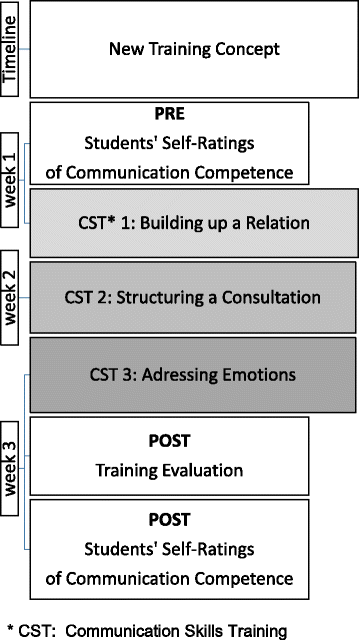Integrating 360° behavior-orientated feedback in communication skills training for medical undergraduates: concept, acceptance and students' self-ratings of communication competence
- PMID: 27756286
- PMCID: PMC5069808
- DOI: 10.1186/s12909-016-0792-0
Integrating 360° behavior-orientated feedback in communication skills training for medical undergraduates: concept, acceptance and students' self-ratings of communication competence
Abstract
Background: Feedback is considered a key didactic element in medical education, especially for teaching of communication skills. This study investigates the impact of a best evidence-based practice feedback concept within the context of communication skills training (CST). We evaluate this concept for acceptance and changes in students self-ratings of communication competence.
Methods: Our CST integrating feedback process comprises a short theoretical introduction presenting standards for good communication and a constructive 360° feedback from three perspectives: feedback from peers, from standardized patients (SPs), and from a trainer. Feed-forward process was facilitated for documenting suggestions for improvements based on observable behaviors to maximize learning benefits. Our CST was applied to four groups of eight or nine students. We assessed the data on students' acceptance using a 6-point scale ranging from very good (1) to poor (6), applied a forced choice question to rank didactic items, and assessed changes in student' self-ratings of their communication competence on a 10-cm visual analogue scale (VAS).
Results: Thirty-four medical undergraduates (82 % female, 18 % male) in their first clinical year, with an average age of 21.4 years (SD = 1.0), participated in the new training. The concept achieved high acceptance from good to very good: overall impression (M = 1.56), sufficient interaction for discussion (M = 1.15), and constructive learning atmosphere (M = 1.18). Specific elements, such as practical training with SPs (M = 1.18) and feedback by SPs (M = 1.12), showed highest acceptance. The forced choice ranking placed all feedback elements at the top of the list (feedback (FB) by SPs, rank 2; FB by trainer, rank 3; FB by colleagues, rank 4), whereas theoretical elements were at the bottom (theoretical introduction, rank 7; memory card, rank 9). Overall, student self-ratings of communication competence significantly improved in nine of the ten communication items assessed by VAS and showed a pre-post effect size of ES = 0.74 on a global rating.
Conclusions: This study demonstrates that the training concept based on 360° behavioral feedback was well accepted and generated significant changes in student self-ratings of their communication competence. Further research is needed to determine the effects on objective communication performance.
Keywords: 360° feedback; CST; Communication skills training; Feed-forward; Feedback; Medical education; Medical students; Training concept.
References
-
- Puschmann T. A history of medical education. New York: Hafner Publishing; 1966.
Publication types
MeSH terms
LinkOut - more resources
Full Text Sources
Other Literature Sources


